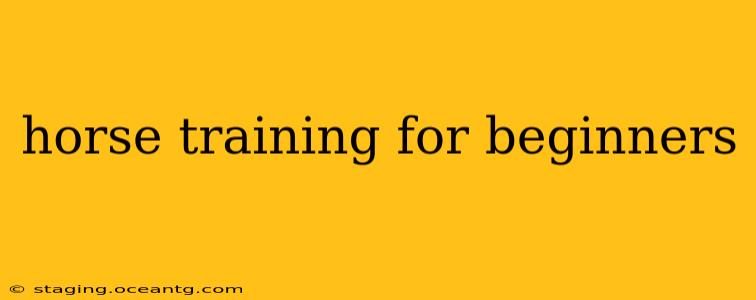Horse training is a rewarding but challenging journey. Whether you dream of competitive riding or simply building a strong bond with your equine partner, understanding the fundamentals is crucial. This comprehensive guide will equip beginners with the knowledge and techniques needed to embark on this exciting adventure safely and effectively. We'll cover everything from groundwork essentials to establishing clear communication, ensuring a positive learning experience for both you and your horse.
What are the basic steps to train a horse?
The basic steps to train a horse revolve around building trust, establishing clear communication, and gradually introducing new concepts. This process often begins with groundwork, focusing on desensitization and basic obedience. This involves teaching the horse to accept your touch, lead calmly, and respond to simple commands like "yield" (moving away from pressure) and "give" (offering a body part). As the horse progresses, you can introduce saddle work, gradually introducing the weight and feel of the tack. Remember, patience and consistency are key throughout every stage. Each step builds upon the previous one, creating a solid foundation for more advanced training.
What is the best method for training horses?
There's no single "best" method for training horses, as different techniques work better for different horses and trainers. However, positive reinforcement methods, which reward desired behaviors with positive reinforcement like treats or praise, are widely considered the most humane and effective. These methods focus on building a partnership based on trust and understanding rather than intimidation or force. Other methods, such as clicker training, utilize a consistent sound to mark desired behaviors, further enhancing the learning process. The key is to find a method that aligns with your personality, experience level, and the horse's individual temperament. Remember to prioritize ethical and humane training practices always.
What are the first things you should teach a horse?
The first things you should teach a horse revolve around building a foundation of respect and trust. This starts with groundwork, focusing on:
- Desensitization: Gradually introducing your horse to various stimuli (touch, sounds, objects) to reduce fear and anxiety.
- Leading: Teaching the horse to walk calmly beside you, responding to pressure from the lead rope.
- Yielding: Teaching the horse to move away from pressure applied gently to different parts of their body. This is crucial for establishing control and responsiveness.
- Ground Manners: Teaching the horse to stand quietly, accept grooming, and tolerate being handled.
Mastering these foundational skills lays the groundwork for all future training. It’s essential to build a positive association with handling and learning.
How long does it take to train a horse?
The time it takes to train a horse is highly variable and depends on several factors, including:
- The horse's age and previous experience: Younger horses or those with little to no training will naturally require more time.
- The horse's temperament and learning style: Some horses are quick learners, while others require more patience and repetition.
- The trainer's experience and skill: A skilled trainer can often achieve results more efficiently.
- The training goals: Basic groundwork may take weeks or months, while advanced riding skills can take years to master.
There’s no set timeframe; focus on consistent, positive progress rather than rushing the process.
What is the easiest breed of horse to train?
There's no single "easiest" breed of horse to train. Each breed has its own inherent temperament and characteristics that can influence trainability. However, breeds often associated with calm temperaments and docility, such as Quarter Horses and Morgans, are sometimes considered easier for beginners. However, even within breeds, individual horses have unique personalities. A horse's individual temperament and past experiences are equally, if not more, important than breed when assessing trainability. The best horse for a beginner is one with a calm, willing disposition and a history of positive handling.
How much does horse training cost?
The cost of horse training is highly variable and depends on several factors including:
- The level of training: Basic groundwork will be significantly less expensive than advanced dressage or jumping lessons.
- The trainer's experience and reputation: Experienced and highly sought-after trainers charge more than those with less experience.
- The location: Training costs can vary widely based on geographical location.
- The duration of training: The more time spent training, the higher the cost.
It’s best to contact local trainers to get quotes and discuss your specific needs and budget.
This guide provides a foundation for beginners embarking on the journey of horse training. Remember that patience, consistency, and positive reinforcement are essential for success. Seek guidance from experienced trainers and prioritize the well-being of your horse throughout the process. Enjoy the rewarding experience of building a strong partnership with your equine companion!
